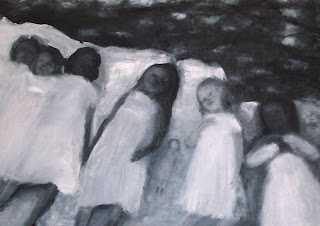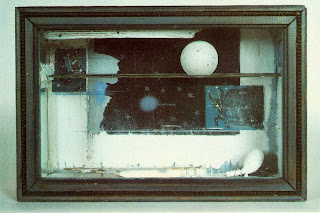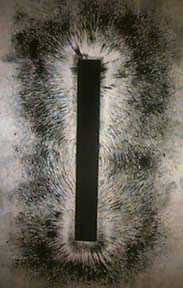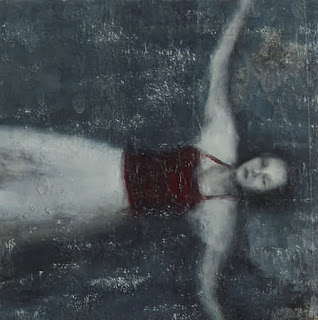Over a long and caffeine-fuelled breakfast with Hamburg-based painter
Miwa Ogasawara, so thin and elegant that I can’t work out where her deep laughter comes from, I ask whether anyone – a gallery owner, for example – ever suggests that she add a bit more blue to one corner of a painting.
 grau
grau
Another peal of that wonderful hearty sound fills my dining room, for a moment lifting the gloom of a grey German morning. Miwa, I realise, is so
alive that her body simply can’t contain her laughter. ‘No,’ she says, still laughing, ‘that doesn’t happen to painters.’
It strikes me that I almost never hear a writer say anything other than ‘I have a great editor’ or ‘My editor made my book much better.’ No wonder I dislike author interviews.
Helen DeWitt has a terrific post on Cormac McCarthy and the semicolon, which obliquely throws some light onto this editing business.
My brain often feels like a lump of iron, but I love the way one little glittery bit of information seems to attract the next, and then the next, just when you need them. Synchronicity or coincidence? I’m not sure I care, but henceforth I’m going to write more of these ‘found’ posts: how exhilarating if the computer screen could be like one of Joseph Cornell’s boxes.
 Cassiopeia 1
Cassiopeia 1
Update: Helen DeWitt has added some
further thoughts about her editor, which in all fairness I need to indicate here lest I give you the wrong impression that my skepticism about editors is hers. It’s good to know just how committed her editor was to
The Last Samurai, a book which I hope many of you will read and which I’ve just discovered to my horror appears to be out of print.
I’m not particularly interested in having an editor, but that is my own quirk. I do realise that most people who publish online want, in their heart of hearts, to be published conventionally. Call me eccentric or mad: you won’t be the first.
 Cassiopeia 1
Cassiopeia 1



Hi Jackie. I’m very curious. Could you describe the way editors work with illustrators? I wonder if the process is different from that involving writers.
I don’t mind editors so much as the marketing departments of publishing houses. Seems like in some places they have too much power and get a bigger voice in decisions about books than the author/illustrator.
I’m not sure ‘interfering’ is exactly the way I see it, Nick. Remember, I’ve never had an editor, and at least theoretically, I’m willing to be convinced. After all, I do listen to criticism – sometimes (grin). However, essentially I look at my work as my own: so what if it’s only as good as I can make it by myself? Or at least as I can make it at a particular point in time: if I were to rewrite Mortal Ghost now, for example, I would take it apart and reconstruct it from the ground up. And three years down the line, very likely I’d want to do the same all over again. After all, I want to be learning, to spend my writing life getting better.
Last night I had a long discussion with a professor of painting about this very issue, and he made the point – with a great deal of justification – that I have a very romantic notion of the Artist, whereas in our modern culture art, no matter which sort, is only art when it becomes a product, i.e. a book isn’t book till it’s published. In other words, the system, not just the individual alone, creates a work of art. Of course this isn’t a new theory (Adorno et al.) but a very useful one to keep in mind nevertheless.
As to painting, he said that I’m not quite correct – that in fact some galleries will make suggestions, others not at all or very little, but of course historically speaking, patrons always had their say too. However, a finished canvas is much more difficult to change than a MS, physically. And some galleries will ask an artist to produce more of a particular sort of work if it’s been selling well, at which point a gallery owner who was present at the dinner chimed in to say how dangerous a game that could be, because it might stifle experimentation.
I suppose that SMD is right: money speaks.
Which is why I prefer the internet.
Jan Mark did a good interview on editors (sorry I don’t have a link):
“I have lost count of my editors over the years. Most have been excellent colleagues, whether or not I enjoyed their methods; some have been adequate and a couple, I am convinced, described themselves as editors because they could not spell amoeba…”
However she goes on to say, “the practices instilled in me by those early martinets saw me through because I had never been allowed to think that the work I delivered was as good as it got. It was only as good as I could make it on my own.”
I think it is worth bearing in mind that a book doesn’t just have the author’s name on it, but the publisher’s too (unless they are one and the same). I don’t personally see editors as interfering. After all, the best bands usually have producers; plays and films have directors. It’s not all the actors, writers and musicians. The exception, as you point out, Lee, is painters. But then I think that kind of art is a different ballpark and I don’t really understand it very well.
Well, remember, the editor is going to make money based on how well the author’s book sells. I don’t know how many editors with a brain would treat their writers like garbage. Then again, how many writers would take bad treatment from an editor if it means the book gets published.
I think that a lot of writers do have good editors and do talk with them often enough. And I’m sure some writers don’t. Problem is finding out which ones have which…
Since I’ve had no personal experience of editors (and only one agent), it would be foolhardy of me to claim that no editor is any good. I’m simply tired of the old refrain, ‘My editor is helping me to write the best book possible.’ That, as far as I’m concerned, is what the writer is supposed to do. In any case, there aint no such creature as ‘best book’.
And yes, I’m perfectly aware that authors don’t say everything they may be thinking. After all, they need to eat. But to watch a performance I prefer the theatre.
Authors tend to be interviewed only at the time of a book’s publication, when they are likely to want to remain on speaking terms with their editor. If they can’t say something complimentary they are likely to evade the question. Peter Carey spoke very warmly of Gary Fisketjon, who edited The True History of the Kelly Gang and sent back the MS covered with suggestions in green ink — PC welcomed this fanatical attention to detail. He did not come out and say this was the first editor he’d had to go to so much trouble, or comment on the practice of previous editors he’d worked with, but we can perhaps infer that he thought this preferable to what he had had in the past.
I am not sure this is what I am looking for, but if the comments were of exceptionally high quality they might be helpful.